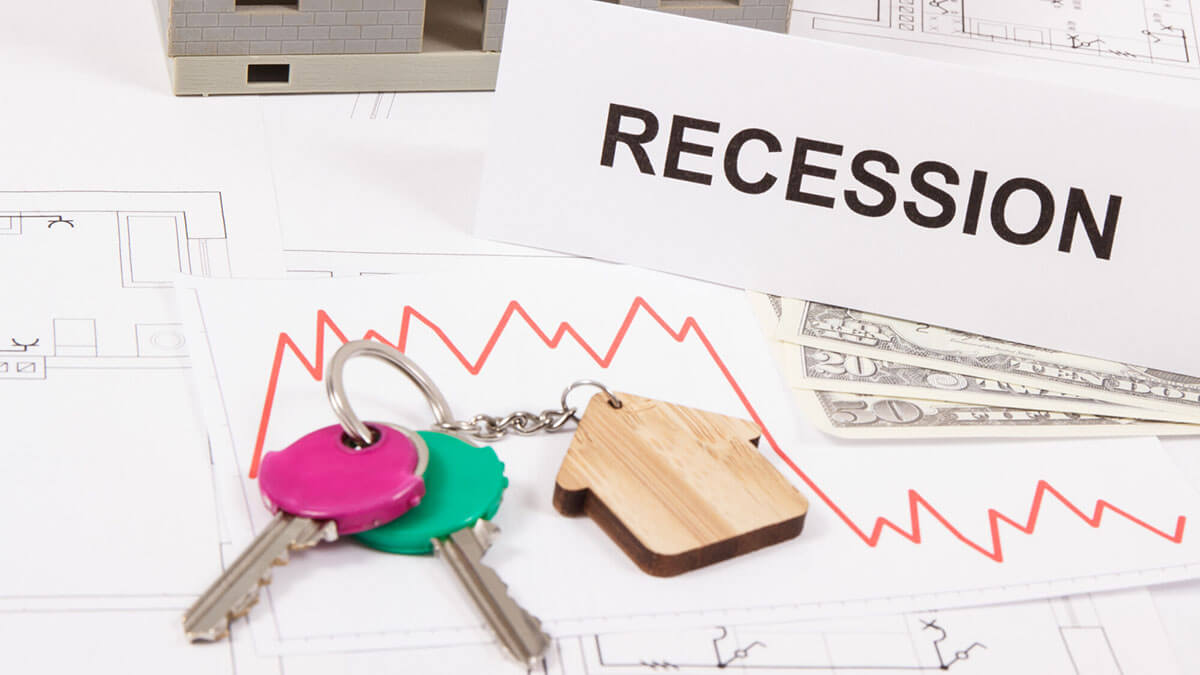With global interest rates already 2% higher than they were in 2021, the World Bank has published a grim prediction of an impending recession in 2023.
We’ve all expected the worst and hoped for the best for some time now. Yet, this official announcement seems to dissolve all hopes of avoiding the inevitable. It’s a particularly concerning prospect for those involved in the real estate market.
If you’re interested in buying a home or selling one, you’re likely wondering if the housing market prices will go down or more importantly when they will go down.
Keep reading to discover the likely scenarios about house pricing in a recession.
What Are the Signs of a Recession?
Nowadays, Democrats and Republicans find themselves embroiled in a hot debate about whether we’re already in a recession or not. The one side says we’ve already entered an economic slump, while the other insists it’s just a bad financial phase.
If you want answers, it’s best to look at the facts available before you panic.
In textbook terms, a recession involves reduced economic performance based on the following elements:
- GDP contraction
- Higher unemployment rates
- Lower consumer spending
These are factors common to all recessions, as they have a widespread impact on every other sector, including real estate.
If you want to get the best price for your home, you need to investigate what these impacts might be.
Will Housing Market Prices Go Down in 2023?
Housing inventory is still low after the excesses of the pandemic, and construction hasn’t returned to normal yet. These two factors alone may keep housing prices afloat even if a recession does occur soon.
If people start to lose their jobs, a different scenario will emerge. Unemployed people can’t pay their mortgages and will likely try to sell their homes to avoid foreclosure.
This is bound to cause an influx of housing amid reduced sales and can result in housing market prices going down.
When considering a home pricing strategy, there are two things you should do first. These are:
Avoid Panic
Try to contemplate the facts without falling prey to sensationalized media reports about what 2023 holds.
According to official figures released by the BEA, the US GDP has dropped in the last two quarters. However, the 1.6% decrease in Q1 improved to 0.9% in Q2, which could indicate things getting better, not worse.
So, while this technically meets the first criterion for an approaching recession, things could be a lot gloomier than they are.
According to the BLS, national unemployment rose to 3.9% in September 2022. Yet, this is still lower than the figures for 2021. What’s more, employment is still stable in 34 states as well as D.C.
Finally, there’s been no decline in consumer spending, despite fears over an approaching economic slump.
If we look at the real estate industry, home sales are down for the sixth month in a row. Prices are starting to slide, too, and forecasters predict the median home price may plummet by 5% by the end of the year.
After the excesses of 2020 and 2021 coupled with rising mortgage rates, that’s hardly surprising.
Is this slowdown simply a return to normality after two years of unprecedented price increases and multiple offers on almost every home for sale, or is it a sign of a looming recession. How will this impact home prices?
Consider the Data from Past Recessions
To know if a recession will affect housing prices, we need to look at past recessions to see what happened then.
Of all the recessions we’ve survived in recent times, the Great Recession of 2007 to 2009 had the biggest impact on the real estate market. How Much Did House Prices Drop in the Recession of 2007 to 2009?
The Great Recession had the largest impact on housing prices, with prices dropping by as much as 20%, while sales declined by 40%. In the decade before the Great Recession, prices soared by over 120%.
Before you start comparing this recession to any other, it’s important to remember that excessive subprime lending caused the Great Recession, to begin with.
According to Harvard University’s Joint Center for Housing Studies insights on past recessions, home prices dropped 5% in 1974 and decreased by less than 1% in 1974 and 1981. The 2001 recession saw a 7% increase in home prices.
From the above, it’s clear that there’s no hard and fast answer to the question, ”Will the housing market prices go down?”. They’re already declining slightly, but as we’re not technically in a recession, this isn’t necessarily recession-related.
The only thing we can deduce from these statistics is that pricing during a recession depends on the length of the downturn, as well as many other factors.
With the above in mind, let’s investigate the ways to price your home right during a recession.
Pricing Strategy During Recession
Home prices aren’t likely to pose a problem for sellers in 2023, but low buyer demand could. During a recession, many people may lose their jobs, and they won’t consider buying a home any time soon.
That means there’s going to be less competition for houses, and we can say goodbye to multiple offers on almost every listing like we’ve seen in past years.
In this type of market, there are a few courses of action open to you as a seller. These are:
Realistic Pricing
High mortgage rates will cause buyers to shop around for the best price. In this light, reducing your asking price a little could help you sell your home faster.
It’s unrealistic to expect your home to sell at the hugely inflated prices we’ve seen in the last two years. Real estate comps can help you determine a fair asking price for your home in the current market.
Remember, home prices are still significantly higher than normal right now.
So, if you get an offer that’s below your asking price, be sure to compare it with what you paid for your home initially. Chances are, you’ll still make a tidy profit.
One useful tip is to price your home according to values that might show up more easily in an online search.
For instance, many online real estate websites allow buyers to filter in increments of $25,000. If you price your home at $351,000, you’re missing out on all the buyers who might choose a maximum value of $350,000.
Add Value for Buyers
In times of low demand, potential home buyers can afford to shop around a little more. In this light, you could attract more buyers by adding extra appeal to your home.
Upgrades are great, but it takes time and money to complete them. Small updates like a fresh coat of paint could help your home stand out against the competition.
Alternative perks you could offer home buyers include paying some of their closing costs or including desirable appliances or furnishings in the sale.
Engage With a Cash Buyer
Selling to a cash buyer is another good option, as these investors remain unaffected by mortgage rates. They’re unfazed by increasing interest rates or the stricter criteria imposed by lenders during a recession.
Cash investors don’t mind buying a home in a less-than-ideal condition, saving you money and time.
A cash sale is also a much quicker option if you need to get rid of a house fast due to an urgent move, a divorce, or to avoid holding costs on an inherited home you don’t want.
Wait it Out
In most cases, selling a home during a recession is not only more difficult, but it also means you might need to consider dropping your price to attract buyers.
It’s unlikely that we’ll see a buyer’s market soon, though. So, if you’re looking to sell your home, you could still get your desired price for it, if you’re prepared to wait.
So, if you’re not in a hurry to sell, it’s often best to wait out the recession until more certain times. On the other hand, if you’re not living in the house, proceeds from the sale can help you weather the recession better.
Should You Buy or Sell a Home During a Recession?
In a recession, the federal government will usually rethink interest rates to stimulate spending. While this is bad news for your savings account, it’s good news for homebuyers.
If this happens, those with a steady income can benefit from buying a home during this time of low demand.
There’s a catch, though. The government’s first defense against inflation is to increase interest rates. Higher interest rates curb spending, which slows down price increases.
If they can get this delicate balance right, inflation should start to ease off a little toward the end of 2023.
How to Sell Your Home Faster
So, will housing market prices go down if a recession hits the USA? Based on data from previous recessions, they may decline. Based on the extreme increases during 2020 and 2021, they should.
Pricing isn’t the biggest obstacle home sellers face as recession looms in our future. Caution on the part of buyers is a far bigger challenge.
So, if you’re in a hurry to sell an unwanted home fast, it makes sense to consider approaching a cash buyer. iBuyer can connect you with a host of committed investors keen to buy homes in any type of market.
Enter your address on our website to see how much you could get for your home today.
Looking for cash offers on your home? You’ve come to the right place!
Reilly Dzurick is a seasoned real estate agent at Get Land Florida, bringing over six years of industry experience to the vibrant Vero Beach market. She is known for her deep understanding of local real estate trends and her dedication to helping clients find their dream properties. Reilly’s journey in real estate is complemented by her academic background in Public Relations, Advertising, and Applied Communication from the University of North Florida.




